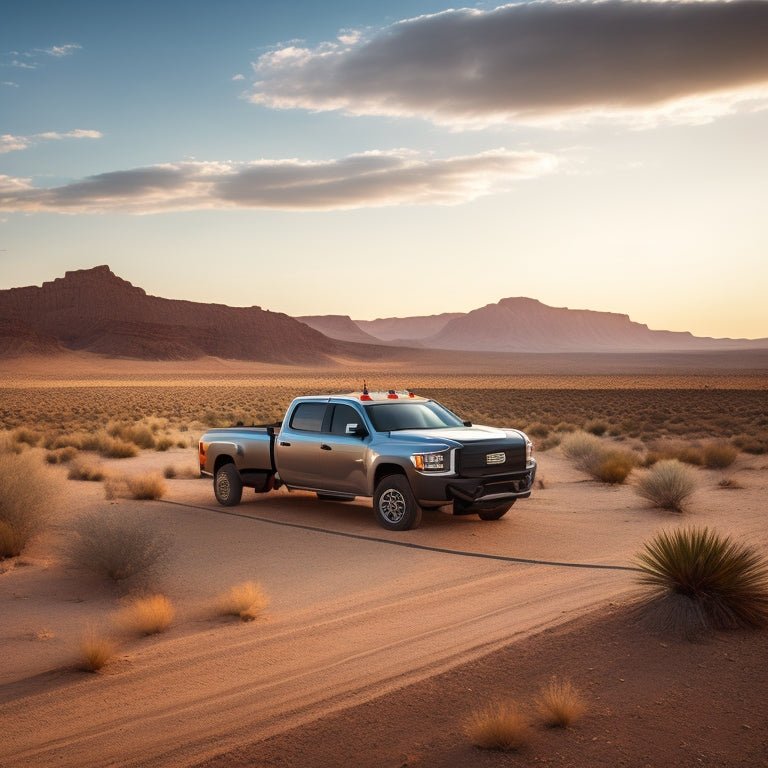
What Solar Panel Kits Are Best for My Truck?
Share
You'll need to calculate your truck's daily power consumption in watt-hours to determine the right solar panel kit size that matches your energy needs. Consider your energy usage habits, device power ratings, and required panel efficiency. Choose between truck bed solar panel kits for space-saving installation or roof mount options with permanent or clamping systems. Guarantee durability and reliability for off-grid adventures. Top brands like Renogy, Off Grid Adventures, and Renewable Rivals offer reliable kits. Now, dive deeper to discover the best solar panel kit for your truck, and get ready to harness the power of the sun.
Key Takeaways
• Assess your truck's daily power consumption in watt-hours to determine the required solar panel size and kit components.
• Consider truck bed or roof mount options, ensuring durability and reliability for off-grid adventures.
• Choose a kit with essential components: solar panels, charge controllers, batteries, and inverters, understanding each component's role.
• Calculate daily energy needs, conducting an energy audit, and consider top brands like Renogy, Off Grid Adventures, and Renewable Rivals.
• Evaluate cost against quality, comparing prices, warranties, and certifications to ensure the best value for your solar panel kit.
Understanding Your Power Needs
To determine the right solar panel kit for your truck, you need to calculate your daily power consumption in watt-hours (Wh), considering the appliances and devices you plan to power on the road. This involves tracking your daily habits, including the devices you use, how often you use them, and for how long. Energy monitoring is vital in this step, as it helps you identify areas where you can optimize your power consumption.
Start by making a list of the devices you want to power, such as laptops, lights, refrigerators, and charging ports. Estimate the power rating of each device in watts (W) and the number of hours you'll use them daily. Multiply the wattage by the number of hours to get the total watt-hours (Wh) per day.
Add up the Wh for all devices to get your total daily power consumption. This calculation will give you a clear picture of your energy needs, enabling you to choose a solar panel kit that can meet your power requirements safely and efficiently.
Choosing the Right Solar Panel
When selecting the right solar panel for your truck, you'll need to evaluate a few key factors to make sure you're maximizing the most out of your investment.
You'll want to assess your energy needs, taking into account the appliances and devices you plan to power.
Assess Your Energy Needs
You'll need to determine how much power your truck's appliances and devices require to function efficiently, as this will help you choose a solar panel kit that can meet your energy demands. To do this, conduct an energy audit to identify the devices that consume the most power and their respective energy requirements. This will give you a clear understanding of your energy needs.
Create a power profile by calculating the total watt-hours (Wh) required to run your devices. Consider the type and number of devices, their power consumption, and the duration of use.
For instance, if you have a 100W fridge that runs for 8 hours a day, it'll consume 800Wh (100W x 8h) of energy.
Consider Panel Efficiency
With a clear understanding of your energy needs, selecting a solar panel that can efficiently meet those demands becomes essential, and that's where panel efficiency comes into play. As you're evaluating solar panel kits for your truck, it's important to prioritize energy harvesting and power output.
Here are three key factors to keep in mind when assessing panel efficiency:
-
Conversion Efficiency: Look for panels with high conversion efficiency, which measures how well the panel converts sunlight into electrical energy.
-
Temperature Coefficient: A low temperature coefficient indicates that the panel's performance remains stable even in high temperatures, ensuring consistent energy harvesting.
-
Fill Factor: A high fill factor indicates that the panel can efficiently convert sunlight into electrical energy, resulting in a higher power output.
Choose the Right Size
Select a solar panel that matches your truck's energy requirements, as undersized panels won't meet your power needs, while oversized ones will add unnecessary weight and expense. When choosing the right size, consider your truck's power consumption, space constraints, and off-grid adventure plans.
For instance, if you're planning an extended off-grid adventure, you'll need a larger solar panel to keep your batteries charged.
Consider the wattage and voltage requirements of your truck's appliances, such as lights, fridge, and communication devices. A higher wattage solar panel will charge your batteries faster, but it may not fit on your truck's roof. Assess your space constraints and balance them with your power needs.
A good rule of thumb is to oversize your solar panel by 10-20% to account for energy losses and varying sunlight conditions.
Truck Bed Solar Panel Kits
Installing truck bed solar panel kits allows you to harness the sun's energy while on the go, providing a reliable power source for your adventures. When going off-grid, it's essential to have a reliable source of power, and truck bed solar panels can provide the energy you need to keep your devices charged and your lights on.
Here are three benefits of truck bed solar panel kits:
-
Space-saving design: These kits are designed to fit snugly in your truck bed, ensuring maximum energy production without taking up valuable storage space.
-
Easy installation: Most truck bed solar panel kits come with a simple, DIY-friendly installation process, making it easy to get started with solar power.
-
Durability: Built to withstand the rigors of off-grid adventures, truck bed solar panels are designed to withstand harsh weather conditions and rough handling.
Roof Mount Solar Panel Options
When considering roof mount solar panel options for your truck, you'll need to decide between permanent mount systems and clamping systems. Permanent mounts are ideal for trucks with a fixed roof shape, providing a secure and long-lasting installation.
Clamping systems, on the other hand, offer flexibility and ease of removal, making them suitable for trucks with varying roof configurations.
Permanent Mount Options
You can securely fasten roof-mounted solar panels to your truck's roof using permanent mount options, which provide a sturdy and reliable connection. With permanent mounts, you can rest assured that your solar panels will stay in place, even in harsh weather conditions or on bumpy roads.
Permanent mount options typically involve drilling into your truck's roof to create a secure attachment point. This requires careful planning to guarantee that the drill patterns align with the roof's structural components. A well-designed rail system can help distribute the weight of the solar panels evenly, reducing the risk of damage to your truck's roof.
Here are three key considerations for permanent mount options:
-
Drill patterns: Make sure that the drill patterns are carefully planned to avoid damaging your truck's roof or compromising its structural integrity.
-
Rail systems: A sturdy rail system can help distribute the weight of the solar panels and provide a secure attachment point.
-
Weather sealing: Make certain that all connections and attachments are properly sealed to prevent water ingress and damage to your truck's electrical system.
Clamping Systems Available
Clamping systems provide a secure and damage-free way to attach roof-mounted solar panels to your truck, eliminating the need for drilling into the roof. This approach guarantees a safe and reliable installation, protecting your vehicle's surface from damage. When selecting a clamping system, consider the type of tightening mechanism and adjustability features.
| Clamping System | Tightening Mechanism | Adjustability |
|---|---|---|
| C-Clamp | Manual screw | Fixed width |
| Adjustable Clamp | Ratchet handle | Adjustable width |
| Rail Clamp | Quick-release lever | Fixed width |
| Squeeze Clamp | Cam lock | Adjustable width |
When choosing a clamping system, consider the weight and size of your solar panel, as well as the type of roof your truck has. Adjustable clamps offer more flexibility, while fixed-width clamps provide a secure fit for specific roof types. Look for systems with easy-to-use tightening mechanisms, such as ratchet handles or cam locks, to ensure a secure and convenient installation. By selecting the right clamping system, you can guarantee a safe and reliable solar panel installation on your truck.
Solar Panel Kit Components
A typical solar panel kit designed for trucks consists of several essential components that work together to provide a reliable off-grid power source. As you consider the best solar panel kit for your truck, it's important to understand the critical components that make up the system.
Here are three essential components to focus on:
-
Solar Panels: These are the heart of your solar panel kit, converting sunlight into electrical energy.
-
Solar Inverters: These devices convert the DC power generated by your solar panels into AC power, making it usable for your truck's electrical systems.
-
Battery Monitors: These devices track the state of charge of your batteries, ensuring you have a clear understanding of your energy levels and preventing over-discharge or overcharge.
These components work together to provide a reliable and safe off-grid power source for your truck. By understanding the role of each component, you'll be better equipped to choose the right solar panel kit for your needs.
Determining Your Energy Requirements
To determine the right solar panel kit for your truck, calculate your daily energy requirements by identifying the appliances and devices you'll be powering, as well as their respective power consumption rates. This is essential to make sure you get a system that can meet your energy demands.
Conducting an energy audit will help you pinpoint areas of high energy usage and identify opportunities for optimization. You'll need to perform load calculations to determine the total power requirement of your system. This involves calculating the wattage and ampere-hour requirements of each device, taking into account factors like duty cycles and usage patterns.
Be sure to take into account both continuous and surge power requirements to ensure your system can handle peak demands. By accurately determining your energy requirements, you'll be able to select a solar panel kit that can efficiently meet your needs, providing a safe and reliable power source for your truck.
Top Brands for Truck Solar Panels
With your energy requirements determined, you can now focus on selecting a high-quality solar panel kit from a reputable brand that can effectively meet your truck's power needs. As you explore the market, you'll come across several top brands that specialize in truck solar panels.
Here are three notable ones:
-
Renogy: Known for their high-efficiency solar panels, Renogy offers a range of kits specifically designed for trucks. Their products are built to withstand harsh outdoor conditions, ensuring reliable power generation on the go.
-
Off Grid Adventures: As their name suggests, Off Grid Adventures caters to outdoor enthusiasts who need reliable power solutions for their trucks. Their solar panel kits are designed to be durable, waterproof, and easy to install.
-
Renewable Rivals: This brand offers a unique blend of quality and affordability, making solar power accessible to a wider audience. Their truck solar panels are built to last, with a focus on durability and high energy output.
When selecting a brand, consider factors like product warranty, customer support, and reviews from other customers. By choosing a reputable brand, you can secure a safe and efficient solar panel kit that meets your truck's power needs.
Considering Budget and Quality
Since you've narrowed down your options to reputable brands, you'll want to weigh the cost of a solar panel kit against its quality to make sure you're getting the best value for your money. As you evaluate different kits, consider the warranty expectations and quality certifications that guarantee your investment will last. A higher-priced kit with a longer warranty and reputable certifications may be a better value in the long run.
Here's a comparison of three solar panel kits, highlighting their prices, warranties, and certifications:
| Kit | Price | Warranty | Certifications |
|---|---|---|---|
| Kit A | $800 | 2-year | UL, CE |
| Kit B | $1,200 | 5-year | UL, CE, ISO 9001 |
| Kit C | $1,800 | 10-year | UL, CE, ISO 9001, IEC |
When evaluating these kits, consider the warranty length and quality certifications. A longer warranty and reputable certifications, such as UL and ISO 9001, can provide peace of mind and ensure your investment will last. While Kit C is the most expensive, its 10-year warranty and additional certifications may make it a better value in the long run.
Installation and Maintenance Tips
Your truck's solar panel kit installation requires meticulous planning and execution to guarantee maximum energy harvesting and a long system lifespan. A well-planned installation will also make certain your safety while on the road.
Before you start, make sure you have the following Toolbox Essentials:
- Wire strippers: for precise wire stripping and minimizing wire damage
- Crimping tools: for secure wire connections
- Multimeter: for voltage and current monitoring
When it comes to Wiring Strategies, consider the following:
- Route wires away from heat sources and moving parts to prevent damage
- Use protective conduit or sleeving to shield wires from the elements
- Keep wiring organized and tidy to prevent electrical shorts
Frequently Asked Questions
Can I Use a Solar Panel Kit to Charge My Truck's Starter Battery?
Imagine your truck's starter battery as a thirsty plant - it needs regular watering to stay healthy. Yes, you can use a solar panel kit to charge it, promoting Truck Electrification and maintaining Battery Health, ensuring a reliable start every time.
Do Solar Panels Drain My Truck's Battery When Not in Use?
When your truck's in idle mode, a good solar panel kit won't drain your battery; it'll actually help maintain battery health by trickling in a small charge, ensuring your truck's ready to go when you are.
Are Flexible Solar Panels More Prone to Damage Than Rigid Ones?
Imagine a flexible solar panel, like a delicate leaf, bending under stress. You'll find that flexible panels, made from thin-film materials, are more prone to damage than rigid ones, which undergo rigorous durability tests, showcasing superior material strength in comparisons.
Can I Expand My Solar Panel Kit in the Future if Needed?
You'll be pleased to know that many modern solar panel kits feature scalable systems with modular design, allowing you to easily expand or upgrade your setup in the future if needed, ensuring a safe and efficient energy solution.
Will a Solar Panel Kit Affect My Truck's Warranty?
When installing a solar panel kit, you won't void your truck's warranty if you follow manufacturer-approved installation standards, pass vehicle inspections, and review warranty terms to guarantee compliance, avoiding warranty voidance.
Related Posts
-

3 Ways Wind Power Boosts Home Value
Living near a wind farm can enhance your property's value in three significant ways. To begin with, proximity to wind...
-

What Does Your Home Energy Audit Report Reveal?
Your home energy audit report reveals a detailed analysis of your energy consumption patterns, highlighting areas of ...
-

7 Best EV Battery Health Trackers for Homeowners
You can maximize your electric vehicle's performance and lifespan by leveraging advanced battery health trackers that...


